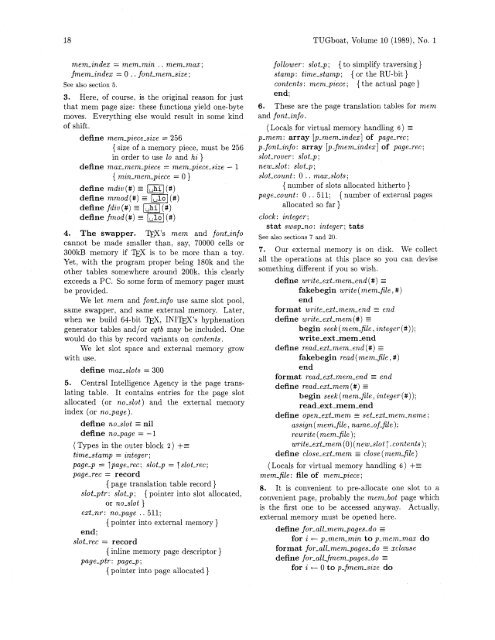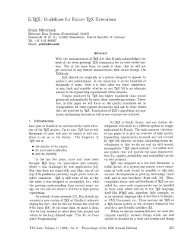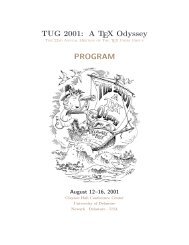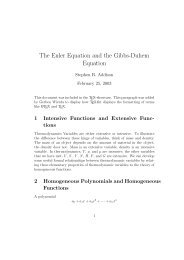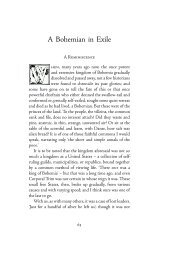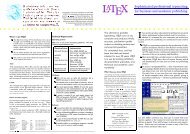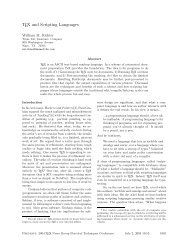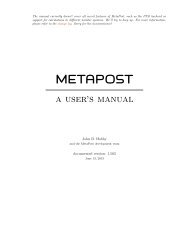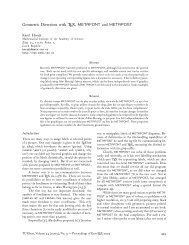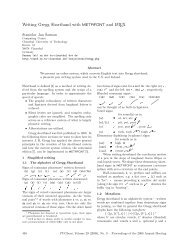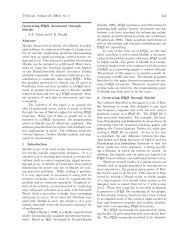Complete issue 10:1 as one pdf - TUG
Complete issue 10:1 as one pdf - TUG
Complete issue 10:1 as one pdf - TUG
You also want an ePaper? Increase the reach of your titles
YUMPU automatically turns print PDFs into web optimized ePapers that Google loves.
18 <strong>TUG</strong>boat, Volume <strong>10</strong> (1989), No. 1<br />
mem-index = mem-min . . mem-max;<br />
fmem-index = 0 . . font-mem-size;<br />
See also section 5.<br />
3. Here, of course, is the original re<strong>as</strong>on for just<br />
that mem page size: these functions yield <strong>one</strong>-byte<br />
moves. Everything else would result in some kind<br />
of shift.<br />
define mem-piece-size = 256<br />
{size of a memory piece, must be 256<br />
in order to use lo and hi )<br />
define max-mem-piece = mem-piece-size - 1<br />
{ min-mem-piece = 0 )<br />
-<br />
define mdiv (#) = I,hll(#)<br />
define mmod (#) = a (#)<br />
define fdiv (#) I,hll(#)<br />
define fmod (#) -<br />
m(#)<br />
4. The swapper. w ' s mem and font-info<br />
cannot be made smaller than, say, 70000 cells or<br />
300kB memory if T@ is to be more than a toy.<br />
Yet, with the program proper being 180k and the<br />
other tables somewhere around 200k, this clearly<br />
exceeds a PC. So some form of memory pager must<br />
be provided.<br />
We let mem and font-info use same slot pool,<br />
same swapper, and same external memory. Later,<br />
when we build 64-bit w, INIm's hyphenation<br />
generator tables and/or eqtb may be included. One<br />
would do this by record variants on contents.<br />
We let slot space and external memory grow<br />
with use.<br />
define max-slots = 300<br />
5. Central Intelligence Agency is the page translating<br />
table. It contains entries for the page slot<br />
allocated (or no-slot) and the external memory<br />
index (or no-page).<br />
define no-slot -<br />
nil<br />
define no-page = -1<br />
(Types in the outer block 2) +-<br />
time-stamp = integer;<br />
page-p = fpage-rec; slot-p = rslot-rec;<br />
page-rec = record<br />
{ page translation table record )<br />
slot-ptr: slot-p; {pointer into slot allocated,<br />
or no-slot )<br />
ext-nr : no-page . . 511;<br />
{ pointer into external memory )<br />
end;<br />
slot-rec = record<br />
{ inline memory page descriptor )<br />
page-ptr : page-p ;<br />
{ pointer into page allocated )<br />
follower: slot-p; { to simplify traversing)<br />
stamp: time-stamp; {or the RU-bit )<br />
contents: mem-piece ; { the actual page )<br />
end;<br />
6. These are the page translation tables for mem<br />
and font-info.<br />
(Locals for virtual memory handling 6) E<br />
p-mem: array [p-mem-index] of page-rec;<br />
p-font-info: array [p-fmem-index] of page-rec;<br />
slot-rover : slot-p ;<br />
new-slot: slot-p;<br />
slot-count: 0 .. max-slots;<br />
{ number of slots allocated hitherto )<br />
page-count: 0 .. 511; {number of external pages<br />
allocated so far )<br />
clock: integer;<br />
stat swap-no: integer; tats<br />
See also sections 7 and 20<br />
7. Our external memory is on disk. We collect<br />
all the operations at this place so you can devise<br />
something different if you so wish.<br />
define write-ext-mem-end (#) =<br />
fakebegin write (mem-file,#)<br />
end<br />
format write-ext-mem-end end<br />
define write-ext-mem (#) -<br />
-<br />
begin seek (mem-file, integer (#));<br />
write-ext -mem-end<br />
define read-ext-mem-end (#)<br />
-<br />
fakebegin read (mem-file,#)<br />
end<br />
format read-ext-mem-en,d end<br />
define read-ext-mem (#) -<br />
begin seek (mem-file , integer (#));<br />
read-ext -mem-end<br />
define open-ext-mem = set-ext-mem-name;<br />
<strong>as</strong>sign (mem-file, name-of-file);<br />
rewrite (mem-file);<br />
write-eat-mem (0) (new-slot T. contents);<br />
define close-ext-mem = close (mem-file)<br />
(Locals for virtual memory handling 6) +-<br />
mem-file: file of mem-piece;<br />
8. It is convenient to pre-allocate <strong>one</strong> slot to a<br />
convenient page, probably the mem-bot page which<br />
is the first <strong>one</strong> to be accessed anyway. Actually,<br />
external memory must be opened here.<br />
define for-all-mem-pages-do r<br />
for i t p-mem-min to p-mem-max do<br />
format for-all-mem-pages-do xclause<br />
define for-all-fmem-pages-do E<br />
for i t 0 to p-fmem-size do


